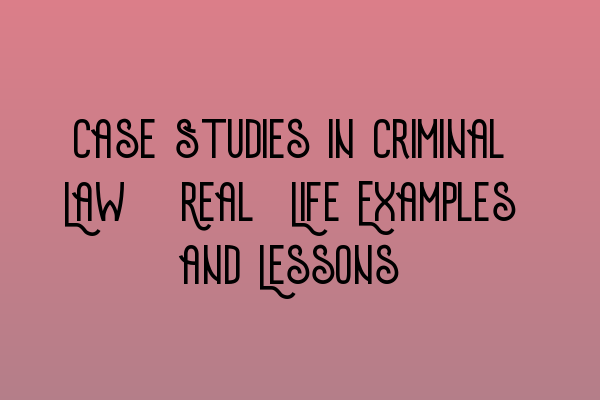Case Studies in Criminal Law: Real-Life Examples and Lessons
As criminal law practitioners, it is essential for us to understand the practical application of legal concepts in real-life situations. Case studies provide valuable insights into the complexities of criminal law, demonstrating how legal principles are applied in different scenarios. In this article, we will explore a series of case studies that highlight key aspects of criminal law and extract invaluable lessons from each case.
Case Study 1: Theft and Consideration
In this case, the defendant was charged with theft under Section 1 of the Theft Act 1968. The key element to be considered was whether the defendant had dishonestly appropriated the property belonging to another with the intention to permanently deprive. This case prompts us to examine the concept of consideration in criminal law, as explored in the article “Essentials of Consideration: Understanding the Backbone of Contracts”. Understanding the importance of proving dishonesty and intention to permanently deprive is crucial in establishing a solid defense or prosecution in theft cases.
Case Study 2: Assault and Implied Terms
Assault cases often involve complex issues of consent and self-defense. In this particular case study, the defendant claimed they were acting in self-defense when they assaulted the alleged victim. The defense relied on the implied term of reasonableness in self-defense cases, as discussed in the article “Express and Implied Terms in Contracts: Decoding Agreement Components”. Understanding the implied terms in criminal law and how they can be applied to justify certain actions in assault cases is essential for both prosecution and defense.
Case Study 3: Fraud and Mistake
Fraud cases often involve intricate legal questions, such as mistake and its impact on agreement validity. In this case, the defendant was accused of fraudulent misrepresentation in a contract. Analyzing the impact of mistake on agreement validity, as explored in the article “Mistake in Contract Law: Unraveling the Impact on Agreement Validity”, can provide valuable insights for both the prosecution and the defense in fraud cases. Understanding mistake as a defense or as an element of the offense can make a significant difference in the outcome of the case.
Case Study 4: Homicide and Legal Strategies
Homicide cases are often emotionally charged and legally complex. Legal practitioners dealing with such cases must have a comprehensive understanding of criminal law and employ effective strategies to maximize their clients’ chances of a favorable outcome. This case study delves into the strategies to study criminal law effectively, as discussed in the article “Strategies to Study Contract Law Effectively: Maximizing Your Learning Potential”. While the article primarily focuses on contract law, applying effective learning strategies can prove beneficial in navigating the intricacies of criminal law.
Case Study 5: Cybercrime and Assignment of Rights
Cybercrime is a growing concern, requiring legal professionals to adapt to the constantly evolving landscape of technology and its legal implications. In this case study, we explore the assignment of contracts in the context of cybercrime. Understanding the rights, obligations, and legal considerations involved in assigning contracts is crucial for tackling cybercrime cases effectively. The article “Assignment of Contracts: Rights, Obligations, and Legal Considerations” provides valuable insights into this topic, enabling legal practitioners to handle cybercrime cases with confidence.
Conclusion
Real-life case studies serve as invaluable resources for criminal law practitioners, offering practical insights and lessons for navigating complex legal scenarios. By incorporating the principles discussed in related articles, such as consideration, implied terms, mistake, legal strategies, and assignment of rights, legal professionals can enhance their understanding and effectiveness in criminal law cases. Staying updated with the latest developments and strategies is essential in successfully representing clients and upholding justice in the criminal justice system.
